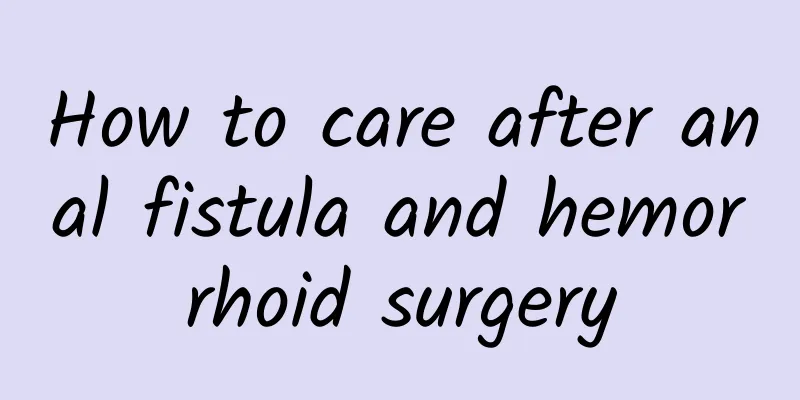How to care after anal fistula and hemorrhoid surgery

|
Anal fistula and hemorrhoids are both diseases of the anus. Diseases in the anus have a great impact on the human body. The body will feel pain when walking, sitting and defecating. People usually use surgery to treat these two diseases. Postoperative care is a very important step for this disease, otherwise it may make the condition worse. The following will introduce how to care after anal fistula and hemorrhoid surgery. 1. After anal surgery, you must try to keep the anal wound clean and dry; there will be a small amount of mucus in the anus after the operation, sometimes light yellow, and the patient will feel that the anus is wet, which is the normal secretion of the rectum; sometimes there will be some pink bloody secretions, which are all normal, no need to be nervous, it is neither infection nor bleeding. 2. If the wound bleeds a lot after the operation, especially if there is still blood flowing out of the anus when lying quietly after defecation, and it cannot stop by itself, you should inform the attending physician in time and go to the hospital for timely treatment; most of the time, a little pressure can stop the bleeding, but a few need secondary sutures to stop the bleeding. 3. Regarding the problem of postoperative wound pain, most patients will have some pain after spinal anesthesia, but it can usually be well relieved by sitting baths, oral painkillers, etc., especially with the improvement of surgical techniques and the application of minimally invasive surgery, which has greatly improved the problem of postoperative pain. The pain process is often that there is no pain in the early postoperative period - the pain starts to worsen after 5-7 days - and then it is fine again. 4. Regarding the problem of defecation, after anal surgery, patients often have more bowel movements, which is often caused by wound irritation. Therefore, it is recommended to have regular bowel movements and avoid going to the toilet frequently. So as not to affect wound healing. 5. Regarding diet: There are not many requirements for diet after anal surgery. Generally, you can eat normally 6 hours after the operation, and drink water normally after the first urination. And no special dietary restrictions are required. 6. Regarding the issue of recurrence, hemorrhoids rarely recur. The most common recurrence is anal fistula, which is often closely related to the characteristics of this type of disease. Even the most experienced anorectal physician cannot guarantee that anal fistula will not recur after surgery. Therefore, timely and effective follow-up and daily care are very important. 7. Regarding postoperative medication, generally speaking, two days of preventive anti-inflammatory drugs are sufficient. A small number of patients need to go home and continue taking some anti-inflammatory and anti-swelling drugs orally. For most patients, the key to postoperative recovery is sitting baths and wound cleanliness care. Therefore, it is very important to take a serious and effective sitz bath or even flush the wound. You must keep these two points in mind. Anal function exercise: 1. The patient contracts the anus for 5 seconds, then relaxes it for 5 seconds, and continues this for 5 minutes, once a day. 2. Use your mind to consciously perform anal exercises. Lift the anus upward, 1-2 times a day, 30 times each time. 3. Anal contraction exercise. Actively contracting and relaxing the anal sphincter for about 5 minutes before, during and after defecation can improve local blood circulation and enhance the function of the anal sphincter. 4. Anal dilation exercises. Use the index finger of your right hand to apply a small amount of lubricating hemorrhoid ointment or antibiotic ointment, first massage the anus for 1-2 minutes, then slowly penetrate into the anus, generally to a depth of two knuckles, and expand the anal canal in four directions, front, left and back, for about 3 minutes. After pulling out the index finger, you can apply a very small amount of hemorrhoid ointment on the anus. Do this once a day for half a month to a month. If long-term Chinese and Western medicine treatment is ineffective, surgical treatment can be performed. Complex anal fistulas are treated with dissection and suture, and drainage and mobile flap suture are performed to achieve a complete cure, maintain the normal function and morphology of the anus, speed up healing, and shorten hospitalization time. |
>>: How to treat anal leakage?
Recommend
How to treat cold uterus and cold body for girls
Cold body is a manifestation of cold uterus. Many...
Tips for face whitening: four quick whitening tips
In life, loving beauty is a woman's nature, a...
Can amitriptyline cure insomnia?
Although amitriptyline sounds very similar to asp...
Is sweat steaming effective for weight loss and beauty?
Beauty and slimming seem to be the goals pursued ...
Causes of Sudden Lumbar Pain
In life, due to long periods of sitting and worki...
How to correct astigmatism by yourself
Astigmatism is a very common disease in daily lif...
What to eat for osteoarthritis
We also call osteoarthritis bone and joint diseas...
What causes oily nose?
There are often some problems on the human body s...
What are the functions and effects of normal saline
The main function of normal saline is to dissolve...
The principle of applying Chinese medicine to the navel to lose weight
The trend of weight loss is once again sweeping C...
How to recover from shoulder effusion
When shoulder joint effusion occurs, it is necess...
I have blood in my stool, is it anal fissure or hemorrhoids? What is the difference between anal fissure and hemorrhoids
Anal fissure and hemorrhoids are two common disea...
How to Remove Moles Home Tips
For some female friends who pursue perfection, th...
Can the hair on the private parts be cut short?
For women, whether the pubic hair in the private ...
How long can you live with rectal cancer?
The most common cancer is rectal tumor. In recent...









